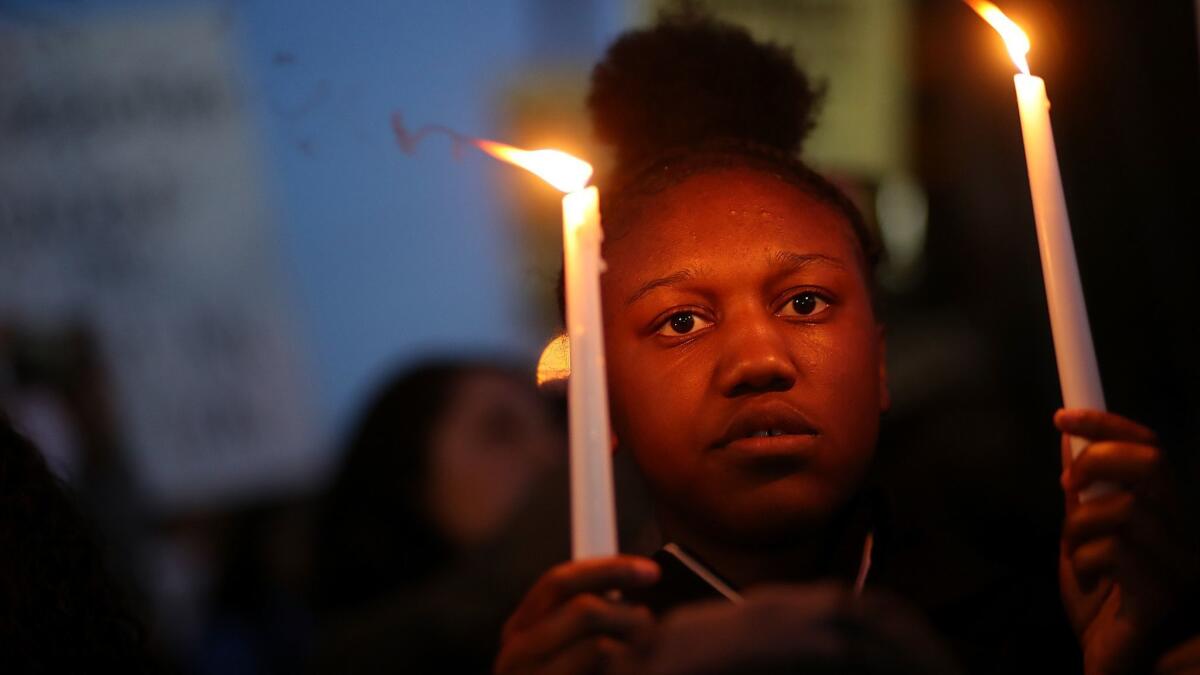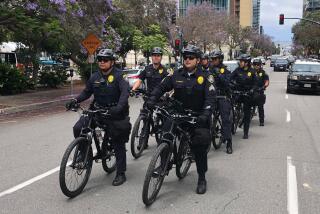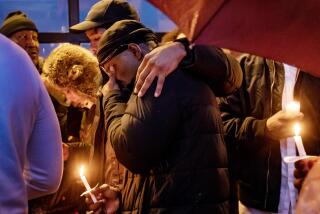Shooting of unarmed black man heightens racial tensions in Sacramento

- Share via
Reporting from SACRAMENTO — The fatal shooting of an unarmed African American man by police last weekend in his backyard has intensified long-simmering tensions between Sacramento’s black community and the police and is testing efforts by City Hall to increase outreach and transparency.
Stephon Clark’s death, captured on video released by the department on Thursday, was the latest of several controversial police shootings of black men in Sacramento in the last few years.
For some residents who protested in the streets, blocking the 5 Freeway and preventing fans from getting to a Sacramento Kings basketball game, Clark’s death was further proof that police officers are afraid of black men. They expressed concern that the officers would not be held accountable for killing an unarmed person.
The protests continued Friday as about 100 people marched to the state Capitol, holding signs and photos of the 22-year-old Clark. Later, a large crowd blocked streets downtown, breaking at least one car window and clashing with police.
“You think, ‘Man, that could have been me, that could have been my brother, that could have been my sister,’ ” said one protester, Elijah Johnson, 24.
Police Chief Daniel Hahn, who started his job in August, is African American. The city was led for years by a black mayor, former NBA star Kevin Johnson.
But mistrust between African American residents and the police remains high. A city that is 35% white is policed by a department that is 74% white. Blacks are 14% of the population and 4% of police officers.
“The reality is there is an underlying culture in the Police Department, a fear of serving in some communities,” said Derrell Roberts, the head of a Sacramento nonprofit that operates youth programs.
Hahn and other city leaders have urged calm while the investigation continues. They released videos of the shooting as an act of transparency and acknowledged that key questions remain unanswered.
The shooting occurred in darkness. A voice can be heard shouting: “Gun, gun, gun!” before officers fire 20 bullets at Clark. The only object found near Clark’s body was a cellphone, according to police.
“This is a tragic event for our entire community,” Hahn told KCRA-TV Thursday night as protesters gathered in the streets. “So yes, there’s a lot of anger, a lot of questions, a lot out there that’s very emotional.”
Hahn said he did not know whether race played a role in the officers’ actions, adding: “I think race factors into almost everything in our country, whether it’s implicit bias, everything … I think it permeates everything.”
The shooting has generated national attention, with House Speaker Nancy Pelosi (D-San Francisco) on Twitter calling the shooting “senseless.”
“His life mattered, and he should be alive today,” Pelosi said.
Sacramento Mayor Darrell Steinberg was more reserved, saying the department should consider increasing its use of less-than-lethal weapons, but did not fault the officers involved. He expressed concern about demonstrators resorting to vandalism or violence.
“That’s not right. Strength is in peaceful resistance,” Steinberg said in an interview Friday, putting his hands over his face. “There has to be a better way.”
He said Clark’s death, though still under investigation, “was wrong” and points to the need for not only more administrative change, but also a reckoning with racism itself.
“Our kids and men don’t feel safe,” said Steinberg, adding that he welcomed the spotlight the city is now under. “There is no danger if we do the right thing, if we push aggressively to change what must be changed.”
The recordings released by the Police Department include a 911 call about a man in a black hoodie breaking car windows Sunday night.
The man “busted both my truck windows out, and he’s in people’s backyards right now,” the caller said.
About 9:25 p.m., officers in a sheriff’s helicopter spotted a man who they said had picked up a “toolbar” and broken a house window.
Video from the helicopter appears to show Clark scaling a tall fence and peering into a vehicle before running into his own backyard.
Shaky body cam footage shows officers running up a dark driveway. “Hey! Show me your hands! Stop! Stop!” an officer yells. They turn a corner and spot Clark in the glare of their flashlights, then take cover behind a building before confronting him once more and firing a barrage of bullets at him.
In November 2016, the Sacramento City Council ordered the release of all video from police shootings within 30 days, except when an ongoing investigation would be hampered or tainted.
The decision to compel the release of videos was spurred in part by the fatal police shooting that July of Joseph Mann, a mentally ill homeless man whom officers tried to run down with their police cruiser.
Audio from an in-car camera captured an officer saying, “I’m going to hit him” and another officer saying: “Go for it,” as the patrol car turned sharply toward Mann.
Mann died less than a minute later, after officers chased him on foot and opened fire, striking him 14 times. They had received reports of a man wielding a knife.
A few months earlier, another homeless black man, Dazion Flenaugh, was shot six times by Sacramento police after fleeing from them armed with a kitchen knife.
The investigation into Clark’s death will include whether it was reasonable for the officers to fire 20 times, Hahn said.
Rashid Sidqe, a co-founder of Sacramento’s Law Enforcement Accountability Directive, said his group helped win the quick release of video footage but has yet to see changes in policing on the streets.
“I’m looking for accountability,” Sidqe said. “I would love to see the police officers fired.”
More to Read
Sign up for Essential California
The most important California stories and recommendations in your inbox every morning.
You may occasionally receive promotional content from the Los Angeles Times.
















